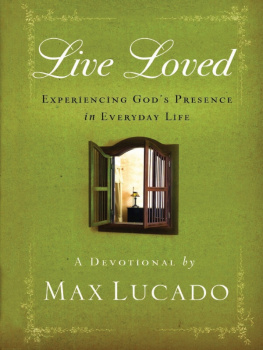Table of Contents
Landmarks
Honor in the Heart
You shall not covet your neighbors house; you shall not covet your neighbors wife, or his male servant, or his female servant, or his ox, or his donkey, or anything that is your neighbors.
Exodus 20:17
I once heard a pastor say that we are the belated announcement of what we have been thinking about for the past thirty days. I have never forgotten it. I can see now that his words rang true because they were a paraphrase of the tenth word.
In a list of clear prohibitions, the tenth word is unexpected. For all the other nine, our neighbor could hold us to account fairly simply by gathering witnesses to testify to our compliance or lack thereof. But here, at the end of the list, we find a sin of a different nature. Idol-making, Sabbath-breaking, dishonoring authority, murder, theft, adultery, and slander can all be identified by an onlooker, but not so covetousness. Covetousness hides in the heart. The Ten Words progress from Dont do it to Dont say it to Dont even think about it.
Jesus has drawn for us a connection to the underlying sin of contempt in his teachings in the Sermon on the Mount. And here, the tenth word acknowledges the truth of his teaching, for no one ever set out to sin against God or neighbor without first desiring something out of bounds. Covetousness and contempt hold hands, for no one ever sought to take from God or neighbor without first desiring to diminish them. Covetousness is a personal offense.
We have seen it in the story of Adam and Eve, who covet what is Gods alone. We have seen it in the subsequent story of Cain, who covets what is his brothers. In both of those stories, no human witnesses could be raised to testify to the sins of desire that preceded the sins of action. But there was one who bore witness. The God who sees bears witness to every sinful desire. The tenth word reminds us at the conclusion of what we understood at the outset: there are no gods before God. It is God who bears witness to our compliance to the tenth word. Long before our covetous desires take the visible shape of words or deeds, Yahweh bears witness against us.
If we were to remember this, more readily confessing our sin at the point of desire, perhaps the words of James would not prove so prophetic in our lives: But each person is tempted when he is lured and enticed by his own desire. Then desire when it has conceived gives birth to sin, and sin when it is fully grown brings forth death (James 1:1415 ).
Desire is a living thing, conceived in the secret place and seeking to grow to maturity. Our words and actions are the birth cry of our mature desires. They are the belated announcement of what we have been thinking about for the past week, month, decadean unholy and gruesome birth, gestated in our hearts, a confession of a crooked course we committed to some time ago. The tenth word is warning us about promiscuity of thought, and of the heart as a fertile womb.
The grammarian in me does not love a mixed metaphor, but when it emerges from the biblical text, I put to death the grammarian in me. The heart is a place where sin gestates. He who has ears to hear, let him hear.
The tenth word is also unexpected because, like the Sabbath command and the stealing command, it anticipates wealth before Israel has it. The itemizing of house, spouse, servants, and animals paints a portrait of wealth. Only a wealthy neighbor would have such an inventory of covet-worthy status symbols. A nation of recently freed slaves has little to covet. In the earliest years of their freedom, there would have been little stratification of wealth or situation.
Yet God prepares them in advance for the social and emotional complexities that would come their way as wealth increased among the children of God. Just as he decreed rest before any might be tempted to profit off the constant labor of another, God forbids coveting before any might have reason to do so. What a mercy that God sees the end from the beginning. He engraves good boundaries for us even before we know we need them.
For certainly we need the tenth word, today as much as then. Stated in the positive, Do not covet becomes Be content. Covetousness hurts the community because it keeps close company with stinginess. The less content we are with our own possessions, relationships, or circumstances, the less inclined we will be toward the generosity that helps the community flourish. It is contentment we see thriving in the early church in Acts, where everything was shared as any had need (Acts 2:4247). We do not share with a neighbor when we perceive our own needs to be paramount. Covetousness whispers that we deserve that which has been given to our neighbor. Contentment states plainly that God has given what is good.
Once we connect contentment to covetousness, we can take steps to combat our ungodly desire for the good others have been given. It turns out that contentment is not something that drops from the heavens like manna. It turns out that the route to contentment is open to us if we look for it. Paul gives us the spectacles to see it, in one of the most familiar passages in the New Testament:
I rejoiced in the Lord greatly that now at length you have revived your concern for me. You were indeed concerned for me, but you had no opportunity. Not that I am speaking of being in need, for I have learned in whatever situation I am to be content. I know how to be brought low, and I know how to abound. In any and every circumstance, I have learned the secret of facing plenty and hunger, abundance and need. I can do all things through him who strengthens me. (Phil. 4:1013 )
If contentment has been a losing battle for you, if coveting comfort or cash or companions has been your common state, let the good news sink in: contentment is learned . It is learned according to the typical pattern of sanctification: through experience, by the power of him who strengthens us. Paul assures us it can be done, and done beyond the bare minimum. He says we can learn contentment in all things . But where do we start? If we determine to learn contentment and unlearn coveting, we must start by becoming good students of what fuels our desires.
Note how the progression from house to people to status symbols and anything that belongs to your neighbor instructs us in three key areas of coveting: stuff, relationships, circumstances . Coveting what someone else has is always a function of a wrong expectation. It is predicated on the idea that we deserve what others have. It feeds on comparison, that old thief of joy, which explains why the covetous person leads a joyless existence of dissatisfaction and contempt. We compare our own situation to that of someone else and allow our expectation to take shape accordingly. The gap between our expectation and our reality is where discontentment and covetousness thrive. As long as our expectations exceed our current reality, we will be particularly prone to break the tenth word.
It is not wrong to have expectations for our stuff, our relationships, and our circumstancesit is just wrong to have unrealistic expectations. As the tenth word points out, we are deeply concerned with keeping up with the Joneses. We want to have a kitchen like their kitchen, a marriage like their marriage, vacations and cars like theirs, smart and athletic children like theirs, flexible work arrangements like theirs. Whatever theyve got, we would likeonly slightly better, as long as were making an adjustment to the balance sheets.
Why do we want it? We illustrate the wisdom of the French proverb: What makes us discontented with our condition is the absurdly exaggerated idea we have of the happiness of others. When we look at our neighbor and covet his stuff, relationships, or circumstances, we commit the grave error of assuming that his stuff, relationships, or circumstances have made him happier than we are. We are actually ridiculous enough to think that if we had what he had, we would be happy.











